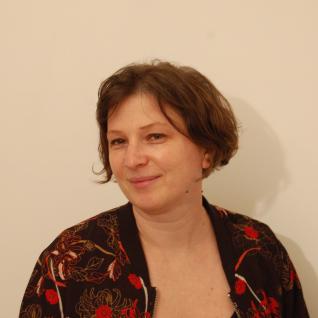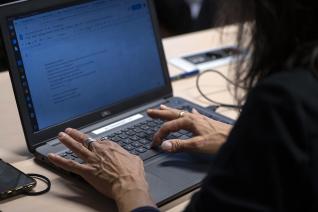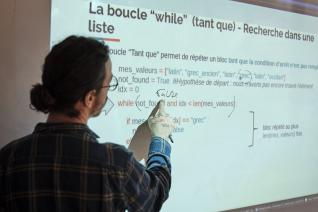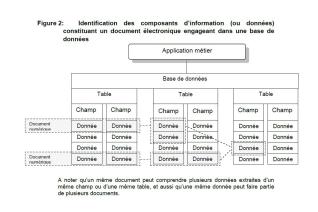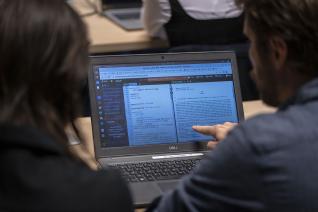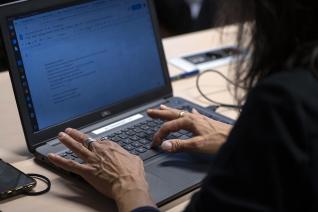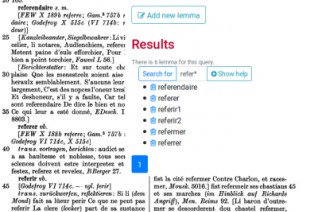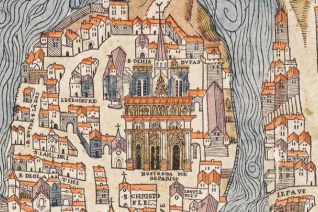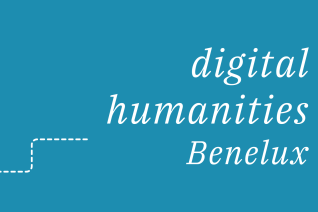Master of ‘Digital Technologies Applied to History’
The ‘Archives—Digital Technologies Applied to History’ master's degree is awarded by Université PSL. It centres on the scientific challenges of processing sources (objects, texts, images) using digital technologies in the service of history and heritage.
Presentation
The master's programme is designed for students who wish to acquire historical and literary source analysis methods, and the digital technologies needed for their research.
This master's degree is affiliated to the Translitteræ graduate programme.
Master of Archives - Digital Technologies Applied to History Brochure
Télécharger
Head of Education
Administrative Contact
etudes @ chartes.psl.eu
Disciplines
Scolarité
Curriculum
First year of the master's programme
The first year of the master's programme includes a common curriculum of courses on sources, archives, books, and media.
These two semesters are based on courses from the ‘Archiviste paléographe’ training programme to ensure proper teaching expertise and coordination.
Admission to the second year of the master's programme is subject to the Teaching Committee’s approval.
The school does not award a ‘maîtrise’ degree.
Second year of the master's programme
The first semester of M2 includes 6 teaching units (EU):
- EU1: Digital document life cycle (digitisation, reporting, archiving and preservation, archival standards including EAD, OAIS and SEDA, access and interoperability, APIs including IIIF)
- EU2: Digital scientific publishing (TEI, LaTeX, XSLT)
- EU3: Data processing (database modelling, semantic web, query languages: SQL, XQuery and SPARQL, data processing, data visualisation)
- UE4: Fundamentals of IT (project management, knowledge of information systems, Linux, introduction to web server management)
- EU5: Introduction to web programming and development (HTML, CSS, Javascript, Python including Flask and SQLAlchemy)
- EU6: Applied English.
Students must complete an internship implementing the skills acquired during the first semester. The internship must include the production of a technical deliverable and will be assessed through a dissertation. The dissertation must provide a problem-based analysis of the documents or data studied and technological choices. The dissertation will be defended between mid-September and mid-October.
2024-2025 model
The M1 Archives - TNAH curriculum comprises 6 units, including a specialisation:
- UE1: Tools and methods, 15 ECTS;
- UE2: Written heritage and heritage institutions, 16 ECTS;
- UE3: Document processing and IT, 6, ECTS;
- UE4: Modern language, 4 ECTS;
- UE5: Personal project, including a short dissertation, an internship of at least one month, and an optional 20-hour course for which students enrol at the end of the first semester, 10 ECTS.
The average grade will be calculated as follows:
- The average for the year is equal to the average for the two semesters;
- The average for the semester is equal to the average of its component units;
- The average grade for a unit is equal to the average of the grades for that unit in the current semester;
- UEs and semesters are offset within the same semester.
M1 and M2 models
Maquette du M1 TNAH (2025-2026)
TéléchargerMaquette du M2 TNAH (2025-2026)
Télécharger
Agenda
The agenda for M1 TNAH follows the ‘Archiviste paléographe’ course agenda. For more information, please contact the School Office.
Write to:
etudes @ chartes.psl.eu
Appel à stages et alternances
Il est possible de proposer un stage ou une alternance pour les étudiant(e)s du master « Technologies numériques appliquées à l’histoire » :
- stages de master 1 (à partir de mai 2026, 1 à 4 mois) ;
- stages de master 2 (à partir d’avril 2026, 4 à 6 mois) ;
- contrats d’alternance (à partir de septembre 2026, année du M2).
Prospects
The aim of the Digital Technologies Applied to History master's degree is twofold:
- Offer students wishing to pursue their studies at doctoral level a methodological training programme that makes extensive use of digital technologies to develop their research.
- Give young historians the opportunity to find a job in the public or private sectors, in organisations or for projects using IT to process or promote primary documents
List of jobs held by the graduates
List of jobs held by graduates (2008-2021)
Télécharger
Report on the professional integration of the graduates
Report on the professional integration of the graduates
Télécharger
Courses
Admissions
Admission
Course entry requirements
Prerequisites
The Digital Technologies Applied to History master's course is part of the Archives major.
Students seeking admission to the Digital Technologies Applied to History programme must have acquired sufficient proficiency in history or literature to take the master's courses. Therefore, there are no general, chronological or thematic history courses in the master's programme.
Conditions d’admission
- First year: Bachelor's degree (Law, Humanities, History, History of Art and Archaeology, Humanities, Social Sciences), or equivalent diploma, with the agreement of the Teaching Committee, after an interview with the Teaching Committee.
- Second year: M1 obtained at the École des Chartes or another higher education establishment, with the agreement of the Teaching committee.
Admission requirements for M1:
- Understand that the master's degree is not a master's degree in archiving in the traditional sense but that it prepares students for careers in the processing and valourisation of written and visual heritage using information technology.
- Demonstrate the required background knowledge, as there are no chronological or thematic courses in this master's programme, which is designed for students seeking to learn historical and literary source analysis methods and the digital technologies required for their research.
- Show a marked interest in digital technology, regardless of form (hardware, programming, news, etc.) or academic categorisation (digital humanities, data science, etc.)
Applying
Master 1
Students can apply on the national master's portal from 26 February to 24 March 2024.
Candidates selected by the teaching committee will be invited to an interview.
Required supporting documents:
- Application with covering letter and CV in French, diplomas and transcripts (from S1 to S6)
- A 1 to 2-page digital project describing a personal project using digital technologies. The project may be one that the student has carried out as part of his or her studies (presentation, group work, internship, etc.), a personal project (website, audiovisual editing, etc.) or a project that the student wishes to complete at the École des chartes (for example, a digital publishing, database or digital archiving project, etc.).
Agenda
- Admission results: 30 April 2024
Only eligible candidates will be contacted.
- Interviews (if eligible): week of 13 May 2024
- Admission results: 4 June 2024
Master 2
Students can submit your application on thePSL application platform from 26 February to 24 March 2024.
Candidates selected by the teaching committee will be invited to an interview.
Agenda
- Admission results: 30 April 2024
Only eligible candidates will be contacted.
- Interviews (if eligible): week of 13 May 2024
- Admission results: 4 June 2024
Application reviews
Applications will be reviewed based on the following criteria:
- Applications meeting the prerequisites
- Results obtained, particularly in history or literature
- Quality and coherence of the research and professional project
- Evidence of motivation, autonomy and intellectual curiosity (international experience, language skills, prizes and scholarships, community activities)
Composition of the recruitment committee: three professors, researchers and/or design or research engineers.
International applicants (excluding nationals of the European Economic Area, Andorra, Switzerland or Monaco) whose country of residence is covered by the Études en France scheme must apply for the first (and the second) year of the Master's programme on the PSL application platform.
The course is available as initial or continuing education.
Future students are eligible for continuing education:
- if you have been out of education for more than three years
- if you are an employee or on individual training leave, looking for a job or retraining for a new career
Registration fees
The Digital Technologies Applied to History master's degree is specifically designed for students who wish to acquire historical and literary source analysis methods and digital technologies useful for their research.
Registration costs for initial education are €250 (+ CVEC €103), and the gap year cost is €164.
Registration fees for continuing education are €3,000 (M1) and €5,000 (M2).
A student’s status falls under continuing education:
-If they have secured funding for the registration fee.
-If they are an employee or on individual training leave, looking for work or retraining.
The master's programme is not open to distance learning or apprenticeship.
The course is open to Erasmus-Socrates students.
- Number of semesters: 4
- Capacity: 15 (M1), 20 (M2)
Health Insurance
Beginning the 2023-2024 academic year, students must also pay a student and campus life contribution (CVEC) of €100.
In some cases, students (particularly those on scholarships) may be exempt from registration fees and the CVEC.
The CVEC is payable on www.etudiant.gouv.fr
Admission results (2024 session)
The results will be published on 4 June 2024.
Examen des candidatures
L’examen des candidatures est basé sur les critères suivants :
- Adéquation des dossiers aux prérequis
- Niveau des résultats obtenus, en histoire ou en lettres notamment
- Qualité et cohérence du projet de recherche et professionnel
- Tout élément attestant de la motivation, autonomie et curiosité intellectuelle (expériences internationales, compétences linguistiques, prix et bourses, activités associatives)
Composition de la commission de recrutement : trois enseignants-chercheurs, chercheurs et/ou ingénieurs d'études ou de recherche.
Les candidats de nationalité étrangère (à l’exclusion des ressortissants de l’Espace économique européen, d’Andorre, de Suisse ou de Monaco) dont le pays de résidence est couvert par le dispositif Études en France postuleront en 1re (comme en 2ᵉ) année de master via la plateforme de candidature PSL.
La formation est accessible en formation initiale ou en formation continue.
Votre statut relève de la formation continue :
- si vous avez interrompu vos études depuis plus de trois ans
- si vous êtes salarié ou en congé individuel de formation, en recherche d'emploi ou en reconversion professionnelle
Frais d’inscription
Le master « Technologies numériques appliquées à l'histoire » est notamment destiné aux étudiants qui veulent acquérir les méthodes d’analyse des sources historiques et littéraires, ainsi que les technologies numériques utiles à leur recherche.
Le coût d’inscription en formation initiale s’élève à 254 € (+ CVEC 105 €), et le coût d’une année de césure à 166 €.
Les coûts d'inscription en formation continue s’élèvent à 3 000 € (en M1) et à 5 000 € (en M2).
Votre statut relève de la formation continue :
- si vous avez obtenu un financement pour le droit d'inscription.
- si vous êtes salarié ou en congé individuel de formation, en recherche d'emploi ou en reconversion professionnelle.
Droits d’inscription des étudiants internationaux : à partir de 2025-2026, des droits d'inscription majorés s’appliquent pour les étudiants internationaux (en mobilité et donc non-résidents) venant d'un pays extérieur à l'espace européen, hors statuts particuliers (réfugiés, partenariats entre établissements prévoyant l'exonération, boursiers du gouvernement français). Les frais d’inscription s’élèvent à 3941 € par an. Les étudiants déjà inscrits à l’École en 2024-2025 ne sont pas concernés.
Le master n’est pas ouvert à la formation à distance.
À partir de 2025-2026, la formation s'ouvre à l'apprentissage pour le M2 uniquement.
La formation est ouverte à Erasmus-Socrates.
- Nombre de semestres de la formation : 4
- Capacité d’accueil : 15 (en M1), 20 (en M2)
Contribution vie étudiante et de campus (CVEC)
Chaque étudiant inscrit en formation initiale doit obligatoirement obtenir, préalablement à son inscription, son attestation d'acquittement de la Contribution de vie étudiante et de campus (CVEC), par paiement ou exonération.
Dans certains cas, les étudiants peuvent être exonérés des frais d'inscription et de la CVEC (boursiers notamment).
Renseignements et acquittement de la CVEC : https://cvec.etudiant.gouv.fr/
Résultats admission (session 2025)
Les candidats reçoivent la notification d'admission sur les plateformes Mon Master et Talent le 3 juin 2026.
Résultats d’admission au master « Technologies numériques appliquées à l’histoire » (2025-2026)
Télécharger

